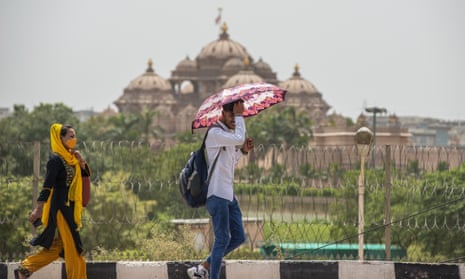Throughout the day Virender Sharma splashes water from a bucket on to the sheet he has pulled over his lilies, tuberoses, carnations and gerberas in an attempt to protect them from the hot, dry wind sweeping through Delhi.
But the street flower seller’s attempts to protect his produce is futile. Since the onset of a brutal heatwave in mid-March, his income has dropped by 60%.
“By lunchtime, they aren’t looking fresh at all and no one wants to buy them,” he said, sweating profusely. “In any case, there are hardly any people passing by on this road because it is just too hot to step out unless you have to.”
According to the latest data from the India Meteorological Department, Delhi has recorded a maximum temperature of at least 42C on 25 days since summer began – the highest number since 2012.
The average summer temperature is usually 36-38C. In mid-May the temperature shot up to 49C in some parts of the city.
March was also the hottest in India as a whole since records began 122 years ago.
The intense and prolonged heatwave has damaged the wheat crop, and made conditions for people who work outside very difficult.
Auto rickshaw wallahs wear damp, rolled towels on their heads. Delivery drivers turn up with their packages at third-floor flats gasping for water.
Anecdotally, people living in Delhi say such high temperatures used to be an aberration. Climate scientists say the prolonged heatwave is undoubtedly the result of global heating.
The heatwave has prompted India to take a strong stand in Bonn, Germany, where officials are meeting to prepare for the next UN climate conference in November in Egypt.
Media reports say members of the Indian delegation have told representatives of rich countries that India is suffering loss and damage owing to the climate crisis. They are demanding massive funding so the government can prepare for extreme weather events by building early warning systems.
The delegation also wants money to carry out reconstruction after extreme events that damage infrastructure, homes and crops.
India’s demand is that if it has to make these large investments, wealthy countries must support it through a “loss and damage” finance facility.
Even the evenings bring no respite. On Sunday, the night temperature was 33C. The Met Office says the heatwave will not break until the weekend.
